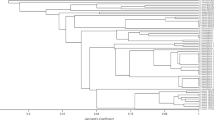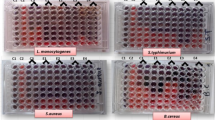Abstract
This study investigated the in vitro potential of the Bidens pilosa as an antibiofilm-antimicrobial against Staphylococcus aureus. This pathogen is the most common causative agent of bovine mastitis, a disease responsible for economic losses in dairy production worldwide. Three extracts were obtained by macerating B. pilosa shoots in 70% ethanol for 4 h, 48 h, or 7 days (BPE4h, BPE48h, BPE7d). BPE4h and BPE48h had higher (p < 0.05) total phenolic and flavonoid contents than BPE7d. The antioxidant activities of BPE4h, BPE48h, and BPE7d were 80.7, 79.5, and 56.3%, respectively. Chromatographic analysis of extracts after solid-phase extraction suggested that flavonols were the major compounds in BPE4h and BPE48h and phenolic acids in BPE7d. Despite their chemical differences, all extracts showed antimicrobial activity against S. aureus (MIC = 0.3 mg/mL). BPE4h at 2 mg/mL completely inhibited and eradicated bacterial biofilms. The IC50 of BPE4h for MAC-T cells was 0.156 mg/mL. Our results show the great potential of B. pilosa as an ecofriendly and low-cost antimicrobial for sanitization of the milking environment for use in organic and agroecological dairy farms.

Similar content being viewed by others
References
Algharib SA, Dawood A, Xie S (2020) Nanoparticles for treatment of bovine Staphylococcus aureus mastitis. Drug Deliv 27:292–308. https://doi.org/10.1080/10717544.2020.1724209
Bartolome AP, Villasenõr IM, Yang W (2013) Bidens pilosa L. (Asteraceae): botanical properties, traditional uses, phytochemistry, and pharmacology. Evid Based Complement Alternat Med 2013:1–51. https://doi.org/10.1155/2013/340215
Brand-Williams W, Cuvelier ME, Berset C (1995) Use of a free radical method to evaluate antioxidant activity. LWT - Food Sci Technol 28:25–30. https://doi.org/10.1016/S0023-6438(95)80008-5
Chandra A, Li Y, Rana J, Persons K, Hyun C, Shen S, Mulder T (2011) Qualitative categorization of supplement grade Ginkgo biloba leaf extracts for authenticity. J Funct Foods 3:107–114. https://doi.org/10.1016/j.jff.2011.03.004
Chavasco JM, Phelipe BHMP, Cerdeira CD, Leandro FD, Coelho LFL, Da Silva JJ, Chavasco JK, Dias ALT (2014) Evaluation of antimicrobial and cytotoxic activities of plant extracts from southern Minas Gerais Cerrado. Rev Inst Med Trop São Paulo 56:12–20. https://doi.org/10.1590/S0036-46652014000100002
Chiang Y, Chuang D, Wang S, Kuo Y, Tsai P, Shyur L (2004) Metabolite profiling and chemopreventive bioactivity of plant extracts from Bidens pilosa. J Ethnopharmacol 95:409–419. https://doi.org/10.1016/j.jep.2004.08.010
Chiang Y, Chang CL, Chang S, Yang W, Shyur L (2007) Cytopiloyne, A novel polyacetylenic glucoside from Bidens pilosa, functions as a T helper cell modulator. J Ethnopharmacol 3:532–538. https://doi.org/10.1016/j.jep.2006.10.007
Chiavari-Frederico MO, Barbosa LD, Dos Santos IC, Da Silva GR, De Castro AF, Bortolucci WC, Barboza LN, Campos CFAA, Gonçalves JE, Menetrier JV, Jacomassi E, Gazim ZC, Wietzikoski S, Livero FAR, Lovato ECW (2019) Antimicrobial activity of asteraceae species against bacterial pathogens isolated from postmenopausal women. PLoS ONE 15:e0227023. https://doi.org/10.1371/journal.pone.0227023
CLSI- Clinical and Laboratory Standards Institute (2006) Performance standards for antimicrobial susceptibility tests supplement M100S16. Clinical and Laboratory Standards Institute, Wayne, PA
Cortés-Rojas DF, Chagas-Paula DA, Costa FB, Souza CRF, Oliveira WP (2013) Bioactive compounds in Bidens pilosa L. populations: a key step in the standardization of phytopharmaceutical preparations. Rev Bras Farmacogn 23:28–35. https://doi.org/10.1590/S0102-695X2012005000100
Diaz MA, Rossi CC, Mendonça VR, Silva DM, Ribon ADO, Aguilar AP, Muñoz GD (2010) Screening of medicinal plants for antibacterial activities on Staphylococcus aureus strains isolated from bovine mastitis. Rev Bras Farmacogn 20:724–728. https://doi.org/10.1590/S0102-695X2010005000013
Fiordalisi SA, Honorato LA, Loiko MR, Avancini CA, Veleirinho MB, Machado Filho LC, Kuhnen S (2016) The effects of Brazilian propolis on etiological agents of mastitis and the viability of bovine mammary gland explants. J Dairy Sci 99:2308–2318. https://doi.org/10.3168/jds.2015-9777
Jaworski A, Lee C (1987) Fractionation and HPLC determination of grape phenolics. J Agric Food Chem 35:257–259. https://doi.org/10.1021/jf00074a022
Krummenauer A, Ponzilacqua B, Zani JL (2019) Atividade Antimicrobiana de Extratos Naturais Sobre Bactérias Causadoras da Mastite Bovina. BIOFARM- J Biol Pharm Agricult Manag 15:436–449
Kviecinski MR, Felipe KB, Schoenfelder T, Lemos De, Wiese LP, Rossi MH, Gonçalez E, Felicio JD, Filho DW, Pedrosa RC (2008) Study of the antitumor potential of Bidens pilosa (Asteraceae) used in Brazilian folk medicine. J Ethnopharmacol 117:69–75. https://doi.org/10.1016/j.jep.2008.01.017
Kviecinski MR, Benelli P, Felipe KB, Correia JFG, Pich CT, Ferreira SRS, Pedrosa RC (2011) SFE From Bidens pilosa Linné to Obtain extracts rich in cytotoxic polyacetylenes with antitumor activity. J Supercrit Fluids 56:243–248. https://doi.org/10.1016/j.supflu.2010.12.011
Laplante KL, Sarkisian SA, Woodmansee S, Rowley DC, Seeram NP (2012) Effects of cranberry extracts on growth and biofilm production of Escherichia coli and Staphylococcus species. Phytochemistry Res 26:1371–1374. https://doi.org/10.1002/ptr.4592
Lee W, Peng CC, Chang CH, Huang SH, Chyau CC (2013) Extraction of antioxidant components from Bidens pilosa flowers and their uptake by human intestinal Caco-2 cells. Molecules 18:582–601. https://doi.org/10.3390/molecules18021582
Liang Y-C, Lin C-J, Yang C-Y, Chen Y-H, Yang M-T, Chou F-S, Yang W-C, Chang CL-T (2020) Toxicity study of Bidens pilosa in animals. J Tradit Complement Med 10:150–157. https://doi.org/10.1016/j.jtcme.2019.04.002
Li-Ping Y, Fei-Hu C, Lu L, Peng-Fei D, Hu B, Ming-Mei Z, Li-Juan X (2019) Protective effects of total flavonoids of Bidens pilosa L. (TFB) on animal liver injury and liver fibrosis. J Ethnopharmacol 116:539–546. https://doi.org/10.1016/j.jep.2008.01.010
Locatelli C, Cremonesi P, Caprioli A, Carfora V, Ianzano A, Barberio A, Morandi S, Casula A, Castiglioni B, Bronzo V, Moroni P (2017) Occurrence of methicillin-resistant Staphylococcus aureus in dairy cattle herds, related swine farms, and humans in contact with herds. J Dairy Sci 100:608–619. https://doi.org/10.3168/jds.2016-11797
Melo PC, Sousa C, Botelho C, Oliveira R, Nader-Filho A (2014) Efeito do hipoclorito de sódio em biofilmes produzidos por Staphylococcus aureus isolados do ambiente de ordenha e de vacas com mastite. Pesq Vet Bras 34:109–113. https://doi.org/10.1590/S0100-736X2014000200002
Moyo SM, Serem JC, Bester MJ, Mavumengwana V, Kayitesi E (2020) Influence of boiling and subsequent phases of digestion on the phenolic content, bioaccessibility, and bioactivity of Bidens pilosa (Blackjack) leafy vegetable. Food Chem 311:126023. https://doi.org/10.1016/j.foodchem.2019.126023
Mtambo SE, Krishna SBN, Sershen GP (2019) Physico-chemical, antimicrobial and anticancer properties of silver nanoparticles synthesised from organ-specific extracts of Bidens pilosa L. S Afr J Bot 126:196–206. https://doi.org/10.1016/j.sajb.2019.07.046
Mushtaq S, Shah AM, Shah A, Lone SA, Hussain A, Hassan QP, Ali MN (2018) Bovine mastitis: an appraisal of its alternative herbal cure. Microb Pathog 114:357–361. https://doi.org/10.1016/j.micpath.2017.12.024
Neto ML, Da Silva RO, Oliveira FF, Costa LCB, Conceição AO, Oliveira RA (2018) Avaliation anti-Candida of essential oils from three medicinal plants species (Astereaceae). S Afr J Bot 115:132–137. https://doi.org/10.1016/j.sajb.2018.01.017
O’Brien B, Gleeson D, Jordan K (2013) Iodine concentrations in milk. Ir J Agric Food Res 52:209–216
Oliveira F, Andrade-Neto V, Krettli AU, Brandão MGL (2004) New evidences of antimalarial activity of Bidens pilosa roots extract correlated with polyacetylene and flavonoids. J Ethnopharmacol 93:39–42. https://doi.org/10.1016/j.jep.2004.03.026
Oszmianski J, Ramos T, Bourzeix M (1988) Fractionation of phenolic compounds in red wine. Am J Enol Vitic 39:1–4
Panda SK, Das R, Lavigne R, Luyten W (2020) Indian medicinal plant extracts to control multidrug-resistant S. aureus, including in biofilms. S Afr J Bot 128:283–291. https://doi.org/10.1016/j.sajb.2019.11.019
Peres NF, Zappa V (2011) Mastite em vacas leiteiras - revisão de literatura. Rev Cient Eletrônica Med Vet 16:1–28
Pinheiro Machado GT, Veleirinho MB, Honorato LA, Kuhnen S (2020) Formulation and evaluation of anti-MRSA nanoemulsion loaded with Achyrocline satureioides: a new sustainable strategy for the bovine mastitis. Nano Express 1:1–16. https://doi.org/10.1088/2632-959X/abbcac
Popova M, Bankova V, Butovska D, Petkov V, Nikolova-Damyanova B, Sabatini AG, Marcazzan GL, Bogdanov S (2004) Validated methods for the quantification of biologically active constituents of poplar-type propolis. Phytochemical Anal 15:235–240. https://doi.org/10.1002/pca.777
Quinn PJ, Markey BK, Leonard FC, Hartigan P, Fanning S, Fitzpatrick E (2011) Veterinary microbiology and microbial disease. Wiley, New York
Rabe T, Staden J (1997) Antibacterial activity of South African plants used for medicinal purposes. Jo Ethnopharmacol 56:81–87. https://doi.org/10.1016/S0378-8741(96)01515-2
Ribeiro RV, Bieski IGC, Balogun SO, Martins DTO (2017) Ethnobotanical study of medicinal plants used by ribeirinhos in the North Araguaia microregion, Mato Grosso, Brazil. J Ethnopharmacol 205:69–102. https://doi.org/10.1016/j.jep.2017.04.023
Roesch M, Doherr MG, Scharen W, Schallibaum M, Blum JW (2007) Subclinical mastitis in dairy cows in Swiss Organic and Conventional Production Systems. J Dairy Res 74:86–92. https://doi.org/10.1017/S002202990600210X
Rojas JJ, Ochoa VJ, Ocampo SA, Munõz JF (2006) Screening for antimicrobial activity ff ten medicinal plants used in Colombian folkloric medicine: a possible alternative in the treatment of non-nosocomial infections. BMC Complement Altern Med 6:1–6. https://doi.org/10.1186/1472-6882-6-2
Santana HF, Barbosa AAT, Ferreira SO, Mantovani HC (2012) Bactericidal activity of ethanolic extracts of propolis against Staphylococcus aureus isolated from mastitic cows. World J Microbiol Biotechnol 28:485–491. https://doi.org/10.1007/s11274-011-0839-7
Schwarz S, Silley P, Simjee S, Woodford N, van Duijkeren E, Johnson AP, Gaastra W (2010) Assessing the antimicrobial susceptibility of bacteria obtained from animals. J Antimicrob Chemother 65:601–604. https://doi.org/10.1016/j.vetmic.2009.12.013
Seigler DS (1995) Plant secondary metabolism. Sprin Sci & Bus Med
Shen Y, Sun Z, Shi P, Wang G, Wu Y, Li S, Zheng Y, Huang L, Lin L, Lin X, Yao H (2018) Anticancer effect of petroleum ether extract from Bidens pilosa L and its constituent’s analysis by GC-MS. J Ethnopharmacol 217:126–133. https://doi.org/10.1016/j.jep.2018.02.019
Silva NCC, Guimarães FF, Manzi MP, Fernandes Júnior A, Gómez-Sanz E, Gómez P, Langoni H, Rall VLM, Torres C (2014) Methicillin-resistant staphylococcus aureus of lineage ST398 as cause of Mastitis in cows. L in App Micr 59:665–669. https://doi.org/10.1111/lam.12329
Silva IF, Guimarães AL, Amorim VS, Da Silva TMG, Peixoto RM, Nunes XP, Silva TMS, Da Costa MM (2019) Antimicrobial activity of ethanolic extracts from Commiphora leptophloeos (Mart.) J. B. Gillett against Staphylococcus spp. Isolated from Cases of Mastitis in Ruminants. Ciên Anim Bras 20:1–14. https://doi.org/10.1111/lam.12329
Singleton VA, Rossi JA (1965) Colorimetry of total phenolics with phosphomolybdic-phosphotungstic acid reagents. Am J Enol Vitic 16:144–158
Soavi L, Stellini R, Signorini L, Antonini B, Pedroni P, Zanetti L, Milanesi B, Pantosti A, Matteelli A, Pan A, Carosi G (2010) Methicillin-resistant Staphylococcus aureus ST398, Italy. Emerging Infect Dis 16:346–348. https://doi.org/10.3201/eid1602.091478
Stepanovic S, Vukovic D, Hola V, Di Bonaventura G, Djukic S, Cirkovic I, Ruzicka F (2007) Quantification of biofilm in microtiter plates: overview of testing conditions and practical recommendations for assessment of biofilm production by staphylococci. J Pathol Microbiol Immunol 115:891–899. https://doi.org/10.1111/j.1600-0463.2007.apm_630.x
Wang R, Wu QX, Shi YP (2010) Polyacetylenes and flavonoids from the aerial parts of Bidens pilosa. Planta Med 76:893–896. https://doi.org/10.1055/s-0029-1240814
Wojnicz D, Kucharska AZ, Sokół-Łętowska A, Kicia M, Tichaczek-Goska D (2012) Medicinal plants extracts affect virulence factors expression and biofilm formation by the uropathogenic Escherichia coli. Urol Res 40:683–697. https://doi.org/10.1007/s00240-012-0499-6
Yang W (2014) Botanical, pharmacological, phytochemical, and toxicological aspects of the antidiabetic Plant Bidens pilosa L. Evid Based Complement Alternat Med 2014:1. https://doi.org/10.1155/2014/69861714
Yang WC, Tien YJ, Chung CY, Chen YC, Chiou WH, Hsu SY, Liu HY, Liang CL, Chang CL (2015) Effect of Bidens pilosa on infection and drug resistance of Eimeria in chickens. Res Vet Sci 98:74–81. https://doi.org/10.1016/j.rvsc.2014.11.002
Yang F, Zhang S, Shang X, Li H, Zhang H, Cui D, Wang X, Wang L, Yan Z, Sun Y (2020) Detection and molecular characterization of methicillin-resistant Staphylococcus aureus isolated from subclinical bovine mastitis cases in China. J Dairy Sci 103:840–845. https://doi.org/10.3168/jds.2019-16317
Yuan L, Chen F, Ling L, Dou P, Bo H, Zhong M, Xia L (2008) Protective effects of total flavonoids of Bidens pilosa L. (TFB) on animal liver injury and liver fibrosis. J Ethnopharmacol 116:539–546. https://doi.org/10.1016/j.jep.2008.01.010
Funding
This study was funded by Conselho Nacional de Desenvolvimento Científico e Tecnológico/CNPq (Edital 39/2013, 403415/2013–6).
Author information
Authors and Affiliations
Contributions
ILP, AAZ, and SK: conceptualization, data curation, methodology, validation, writing—original draft, review, and editing. ILP: laboratory work; SK: funding acquisition, project administration, writing—review and editing.
Corresponding author
Ethics declarations
Conflict of interest
The authors declare no competing interests.
Additional information
Publisher's note
Springer Nature remains neutral with regard to jurisdictional claims in published maps and institutional affiliations.
Rights and permissions
Springer Nature or its licensor (e.g. a society or other partner) holds exclusive rights to this article under a publishing agreement with the author(s) or other rightsholder(s); author self-archiving of the accepted manuscript version of this article is solely governed by the terms of such publishing agreement and applicable law.
About this article
Cite this article
Piccinin, I.N., Zielinski, A.A.F. & Kuhnen, S. Invasive plant Bidens pilosa as an ecofriendly antibiofilm-antimicrobial against Staphylococcus aureus for bovine mastitis control. Org. Agr. 13, 73–82 (2023). https://doi.org/10.1007/s13165-022-00415-0
Received:
Accepted:
Published:
Issue Date:
DOI: https://doi.org/10.1007/s13165-022-00415-0




